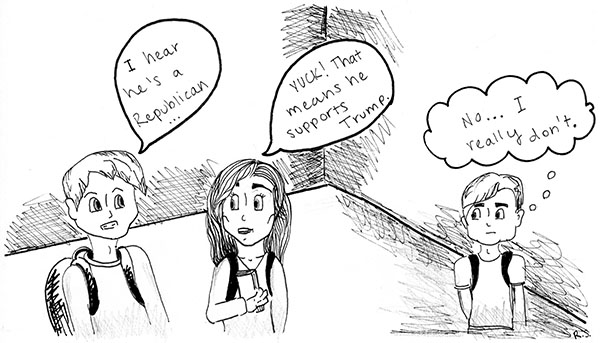Right wing does not signify support for Trump
Stigma at South causes many Republican students to keep beliefs silent
October 6, 2017
It was the day after the 2016 presidential election when I felt a hot whisper on my ear murmur, “So, are you a Republican?” These two friends of mine anxiously hovered over my shoulder to ensure the exchange was kept private and desperately awaited my answer.
The caution in their tone and the minimal volume of their question was really nothing surprising to me, considering the context of the question. Last year’s presidential election season was a very sensitive time.
It is no secret that during this presidential election season, President Donald Trump discussed some very controversial ideas which many students and teachers at South disagreed with. For example, many students spoke out against Trump’s comments aimed at women and his racial slurs. As a proactive school toward political and social affairs, South students should certainly pat themselves on the back for voicing their beliefs.
However, over the course of election season, I sat back and watched something interesting happen. Within just a few months, it seemed as though being a Republican had become a sin at South. It seemed as if telling a peer you identified as a Republican could be heard as a dirty and forbidden word.
In an mock election run at South last October by the League of Women Voters, 35% of the 665 student and teacher voters supported Donald Trump/Republican party compared to 45% that supported Hillary Clinton/Democratic party. So clearly, there are Republican students here… a good amount of them… but where are they?
I’ve heard a lot of discussions since this past November consisting of urgent questions such as, “You’re a Republican? So you support Trump?” and declarations that friendships must be ended over this political affiliation.
After analyzing the situation, I realized a handful of my peers began translating ‘Republican’ to ‘Trump supporter’, despite Trump’s large tangent from the party’s values.
The infamous “If you are Republican, you support building a wall along the U.S. Mexican border,” and, “yes, you must also disrespect women,” proclamation plagued my classrooms in different doses. Sadly, many of my Republican peers have told me their ideology has morphed from a public opinion into a well-kept secret since the presidential election.
Senior Tricia Katsamakis, who identifies as a Democrat , notices the prevalence of this issue at South on both sides of the political spectrum.
“Just because I am a liberal, people thought I loved Hillary Clinton and everything she did, which isn’t true,” Katsamakis said. “I think [in the same way], Republican students at South probably also feel misjudged because of their political stance.”
Affirming the idea that political party affiliation does not signify support for an idea or candidate in a particular party, senior Jarrett Prchal, identifying as independent, shared his opinion.
“I think the left is ideologically homogeneous in our area and for the most part across the country,” Prchal said. “I think many people assume that the right is just as ideologically homogeneous as the left and that is not the case. The right is ideologically diverse. John McCain’s votes on health care are a prime illustration of this point,” Prchal said.
Prchal explains how he feels uncomfortable talking about his Republican-tinted values because he believes a simple policy discussion can turn into an attack on a party’s character.
“I feel…that I have to be very careful about what I say because it is so hard to take back something that may be repeated out of context,” Prchal said.
This scenario is similar to music: being a Republican supporter does not equal being a Trump supporter, just like being a pop music fan doesn’t guarantee somebody is a Pitbull fan. I mean, I love listening to B96 but c’mon… Mr. Worldwide, really? People who associate with a party do not necessarily support all the ideas of a major candidate who stands with this party, especially in the wake of Trump’s extreme ideas.
We should not let Trump, an unpopular commodity for many at South, spoil the reputation of Republicn idealogy for those who are respectful and justified in their beliefs.
I believe the best way to overcome this is to stay educated in the news, respectfully ask questions about each other’s ideologies and initiate conversations in history classes about this issue instead of resorting to assumptions.
Katsamakis echoed a similar sentiment toward working for improvement. “It will always be more uncomfortable for Republican students…because of the democratic majority at Glenbrook South, but being more accepting of other people’s views and refraining from making assumptions can only help GBS be a more inclusive space,” Katsamakis said.
The bottom line is that no student should have to feel uncomfortable with their beliefs because of an unpopular figure’s jabbing at the reputation of a party.
We, as a student body, cannot assume that just because a student leans toward Republican values means they support Trump’s radical ideas. And as we, an academic institution, learn to be more aware and supportive of this, then we can successfully pride ourselves on inclusivity.
And while we’re on the topic of respecting each other’s ideas… sorry to any Mr. Worldwide fans I may have offended— he’s the bomb.com!



